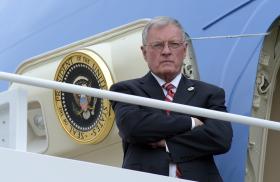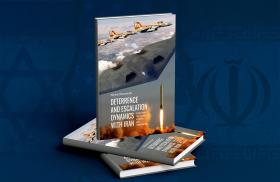- Policy Analysis
- PolicyWatch 4100
Israel Strikes Qatar: Implications for Gaza Diplomacy, Gulf Relations, and U.S. Policy
A compilation of Washington Institute views on the fallout of the targeted strike on Hamas leaders in Doha, including what the United States and its partners can do to translate this latest Israeli military surprise into beneficial political achievements.
A Springboard to “Day After” Talks on Gaza?
Robert Satloff
Yesterday’s attack on Hamas leaders in Qatar dramatically shakes up diplomacy surrounding the Gaza war. The most critical question is whether Israel’s move shuts the door on ceasefire talks or opens opportunities to change the current dynamic with an eye toward ending the horrific conflict.
The strike appears to have been triggered in part by Hamas’s apparent rejection of President Trump’s “all for all” proposal, under which the group would release all hostages (dead and alive) in exchange for a sizable number of Palestinian prisoners, triggering a sixty-day ceasefire and continued negotiations for a permanent agreement to end the war. Reports vary about whether (and how much) the United States had foreknowledge of the operation, but either way the diplomatic fallout is spreading quickly. In Washington, the Trump administration pursued immediate damage control by reaching out to Qatari leaders, publicly questioning the wisdom of Israel’s operation, and reemphasizing the importance of America’s relationship with the Gulf nation. More broadly, the strike is raising numerous questions about the risk of Hamas retaliation against Israeli hostages, the volatility of Qatar’s response, the potential reaction from Israel’s Arab treaty partners, and other weighty issues. The incident also adds to the international impression that Jerusalem has adopted a provocatively maverick—some would say reckless—approach to national security.
Ultimately, the best metric to judge the wisdom of this military move is the extent to which various players translate it into political achievements. That could happen if:
- the elimination of Hamas’s external leadership becomes a sobering moment for what is left of the group’s internal leadership in Gaza, spurring them to reconsider their views on a ceasefire;
- Egypt embraces the new reality in which it is now the preeminent external mediator and presses Hamas leaders in Gaza to accept Washington’s proposal;
- President Trump adopts a more assertive approach and urges Israeli leaders to declare victory and shift their policy away from a Gaza City offensive and toward a “day after” plan. The White House had such an opportunity after the twelve-day war with Iran but chose not to pursue it; the Qatar strike offers a second bite at the diplomatic apple.
Damage Control on the U.S.-Qatari Defense Relationship
Elizabeth Dent
Although Washington and Doha are still riding the high of President Trump’s May visit to Qatar and the estimated $1.2 trillion in bilateral agreements it yielded, the fact remains that the country has been targeted by two military attacks since then, due largely to U.S. actions. In June, Iran retaliated for the U.S. military strikes against its nuclear program by launching missiles at Qatar’s al-Udeid Air Base, the largest U.S. military facility in the Middle East and the primary hub for American air operations in the region. Although that attack realized Doha’s worst fears about partnering with the United States, Qatari concerns were allayed somewhat by the successful defense cooperation on display when the missiles were intercepted and casualties were avoided. Yet the Israeli strike will almost certainly undermine Doha’s trust in the relationship, especially since it took place amid U.S.-backed ceasefire negotiations, was reportedly communicated to Washington in advance, and targeted residential buildings situated next to a school and gas station.
What might this mean in practice? For one thing, Qatar’s fear of additional military operations on its soil may spur it to begin limiting U.S. maneuverability out of al-Udeid, especially if other Arab states ramp up pressure on Doha to impede further U.S. or Israeli military action. This could strain Washington’s defense coordination not only with Qatar, but also with other Gulf partners. In addition, public anger over the attack could heighten the risk environment for U.S. service members and assets operating out of al-Udeid, forcing them to reassess protective measures and contingency planning. Israel’s strike will also likely weaken one of the Trump administration’s main diplomatic bridges for resolving the Gaza war. The challenge now lies in convincing Doha to maintain both its own role as a crucial mediator and America’s full operational capability at al-Udeid.
GCC Ripple Effects
Simon Henderson
Qatar’s relations with the other members of the Gulf Cooperation Council have often been tense, particularly after Saudi Arabia, the United Arab Emirates, and Bahrain broke off diplomatic and trade links with Doha between 2017 and 2021. Yet Israel’s strike in Doha prompted most GCC capitals to express a shared sense of outrage via seemingly synchronized public statements—especially because the attack appears to have been carried out with at least some foreknowledge by the United States, their closest great-power supporter. In recent years, Qatari leaders continued allowing Hamas to maintain a local political presence at Washington’s request in order to facilitate communication with the group, despite some foreign policy circles disapproving of Doha’s ties with the terrorist group. The Doha strike could make Gulf officials question what such understandings with Washington are really worth.
In a noteworthy personal display of solidarity, Emirati President Muhammad bin Zayed paid a rare visit to Doha today to meet with Emir Tamim. Saudi Crown Prince Muhammad bin Salman is expected to visit tomorrow.
As for their potential responses to Israel, only the UAE and Bahrain have formal diplomatic relations with Jerusalem, but the other Gulf states have longstanding ties of their own based on business links and clandestine government contacts. In some ways, Qatar has become “Israel’s greatest friend in the Gulf,” as one U.S. official has repeatedly told the author. Yet the Doha attack will probably freeze such ties while GCC capitals judge their value, and some adjustments seem likely.
GCC military cooperation with the United States could suffer as well, especially if leaders conclude that American assets at al-Udeid Air Base facilitated the strike or deliberately looked the other way. The base’s joint command center has been crucial to defending Israel against repeated salvos of Iranian missiles and drones, with Doha even permitting at least one Israeli liaison officer to be assigned to the facility. All of this vital cooperation could be at risk after yesterday’s strike.
Clandestine video of the attack also indicates the extent of Israeli undercover operations in Qatar, raising questions about what other intelligence activities it might be conducting there. The resultant Gulf furor is reminiscent of 2010, when Israeli agents killed a Hamas gun runner in a Dubai hotel while he was en route to Iran. Indeed, the implications for Gulf public opinion cannot be discounted. Although all of the GCC states are autocracies, their leaders still have to take public views into account when making major policy decisions. Gulf attitudes toward Israel were already worsening due to the Gaza war and the hardship experienced by Palestinian civilians; the Doha strike could accelerate this slide.
Why Did Israel Strike Now?
David Makovsky
The Israeli security cabinet's decision to conduct a strike in Doha was taken following the Hamas-orchestrated bus shooting in Jerusalem on September 8, though officials apparently had differing views about the operation’s timing. Mossad chief David Barnea, Israel Defense Forces Chief of Staff Eyal Zamir, and military intelligence chief Shlomi Binder all questioned the wisdom of carrying out the strike while negotiations were in process. As of this writing, there is no evidence that the attack succeeded in killing senior Hamas officials, reinforcing reports that the Mossad was not a full partner in the operation.
Although one cannot know for sure why the cabinet overrode this timing concern and proceeded with the strike anyway, a few factors may shed light on their decisionmaking. First, the killing of six civilians in the Jerusalem bus shooting combined with four Israeli soldiers killed in Gaza resulted in ten high-profile deaths in one day—a concentration of national mourning and anger that was atypical even for the past two years of war footing. Second, Prime Minister Binyamin Netanyahu did not seem to believe that a grand hostage deal was in the cards. Multiple reports suggested that Hamas was going to reject or delay President Trump’s latest proposal to release the hostages, which did not guarantee an Israeli withdrawal from Gaza—a concession that Hamas seems to regard as nonnegotiable. Third, Netanyahu may have seen a Qatar strike as obviating the need for a ground assault on Gaza City or at least creating a dynamic that could enable him to pause that imminent operation. Even the far-right ministers at the cabinet table could not argue that Netanyahu was being soft on Hamas after the Doha strike.
One should also consider the degree to which Qatari affairs in general have become increasingly controversial among Israelis. Even as it mediated various talks with Hamas over the years, Qatar has come under criticism for its financial support to the group’s enclave in Gaza, at least some of which was diverted to fortify tunnel networks and other military infrastructure. Moreover, Netanyahu has taken political flak from the ongoing “Qatargate” investigation into money that his aides reportedly earned to boost Doha’s popularity. He may have reckoned that striking Israel’s nemesis on Qatari soil could put allegations that he is soft on Doha to rest.






